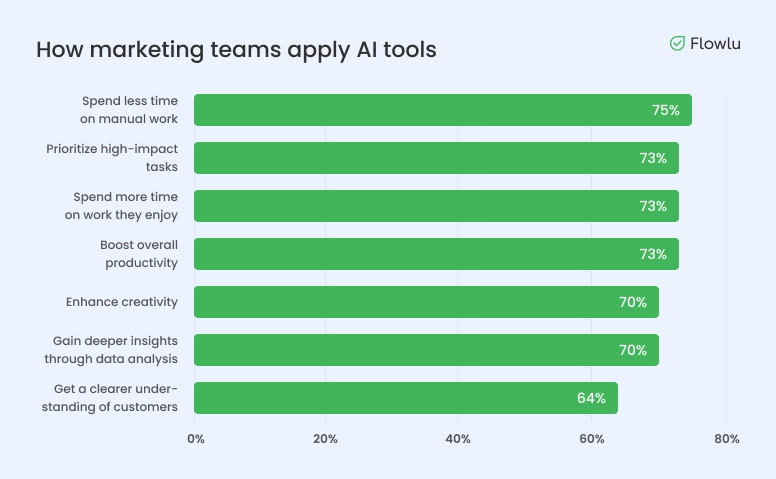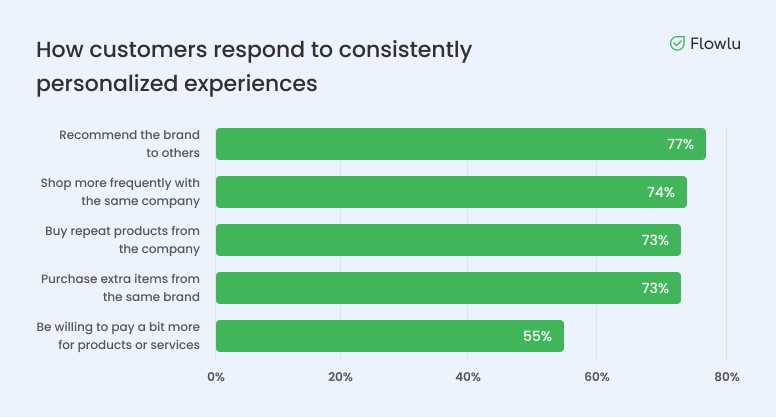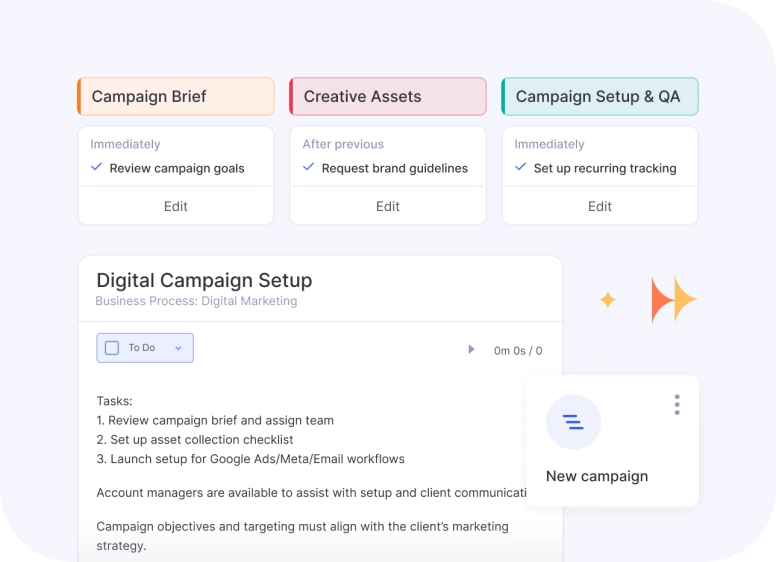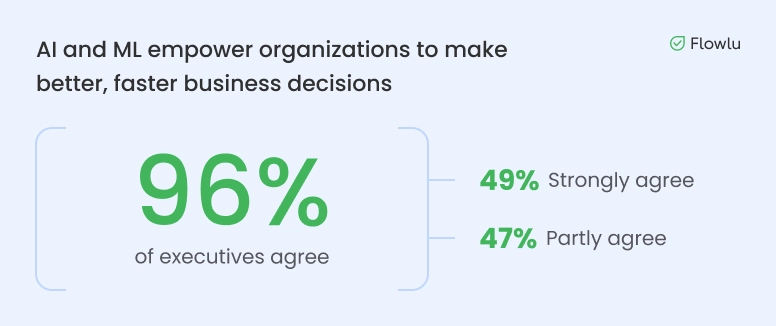How Small Businesses Can Use AI Automation to Compete With Larger Companies
Running a small business is not easy at all. Competing with larger companies? That feels almost impossible. Bigger brands have larger budgets, bigger teams, and more advanced tools. But all that’s about to shift with artificial intelligence (AI) in the playing field.
With the correct AI tools for automation, small business owners can make automatic the repetitive tasks and give more personal experiences without needing to hire more people. Let’s see more close how AI automation helps small businesses to grow in a smarter way and offer a kind of customer service that feels like the big brands.
Why small businesses need AI automation
Small business owners have to do many things at the same time: payroll, marketing, customer service, and much more. The list really never finishes.
Here is how AI automation helps to take away part of that weight, giving you more time and energy to grow your business.
Automates busywork so you can focus on growth
For small business owners, the repetitive tasks can easily fill all the day. That’s why, according to HubSpot’s AI Trend Report, 75% of marketers are already using AI to reduce the manual work.
Here are some of the ways it handles your busywork to save you time:
- Manages schedules: AI books the meetings, sends the reminders, and organizes the calendars for all the team: from the work shifts to the project timelines.
- Handles customer questions: Chatbots answer the frequent questions fast, track the orders, reset passwords, and keep your inbox more clean.
- Controls inventory: The automation warns you when the stock is low, predicts when the demand will go up, makes new orders automatically, and helps to avoid shortages.
- Keeps the work moving: The automation sends the approvals, gives the tasks, sends alerts, and shows where the work is getting stuck.
AI can also help capture important meeting notes. Transcription tools like Fathom, Fireflies, Otter and other alternatives can summarize discussions, sales pitches, and webinars — and then highlight next steps.
With that time back in your pocket, you can stop treading water and start moving forward. You can finally tackle that new product idea or chase the bigger opportunities you’ve had on hold.
Delivers personalization at the level of big brands
Today’s customers expect experiences that feel personal and made just for them, and they give more support to the businesses that can offer it.
As Genesys says, people buy more times, choose more products, and even pay more money when a brand gives them a service that always feels personal.
But small businesses attempting to personalize by hand are fighting a losing battle. You need AI automation to meet this demand at scale.
AI automation can analyze a customer’s needs and create tailored message variations to resonate with those needs. It can then send the messages to the correct customer groups at the right moment.
This way, you build better relationships with your customers and create loyalty with the same level of sophistication as the bigger companies.
6 ways small businesses can use AI automation to compete with big companies
Small businesses already know how to work hard and move fast.
What they usually don’t have is the time or the people that big brands always have available.
AI automation helps to close this gap by removing the repetitive work, automating the creative tasks, and improving the complete experience.
Here are six ways small businesses can use AI automation to stay competitive:
1. Streamline customer service
According to Genesys, 82% of consumers say a company is “only as good as its service”.
For small businesses, keeping up with what customers expect more and more each day feels like too much sometimes. People now want instant answers from knowledgeable teams, in their preferred channel and tone.
AI customer service automation offers the solution, without hiring huge call centers with service agents.
As AI statistics show, with AI automation, the workflow shifts from burnt-out agents juggling endless tickets to a streamlined process that looks like this:
- AI chatbots respond to routine customer interactions instantly.
- Automated workflows route complex customer issues to the right human agent.
- The automated surveys and tools for sentiment analysis collect the opinions of customers in real time.
- The AI analytics analyzes this feedback automatically and creates reports and insights.
No more overworked service reps. You promote faster response times, consistent support, and happier customers.
2. Personalize customer experiences at scale
Personalization creates confidence because it shows to the customers that you see them and that you value them. They want you to understand their preferences and speak in their same tone, so every experience feels made only for them.
As a small business, you simply don’t have the labor force to do this manually.
Thankfully, AI automation can analyze customer data to tailor recommendations, offers, and wording to individual customer segments.
And it can do this at scale.
3. Support sales teams
Small businesses have small sales teams. (If they have a sales team at all.) This makes it extremely challenging to pursue every lead and manually nurture every prospect.
AI sales automation can help sales teams manage the funnel by:
- Triggering sales campaigns and AI workflows inside CRM systems
- Scheduling meetings and follow-ups automatically
- Scoring leads based on buying intent
- Assigning sales tasks
But there’s more.
Agentic AI can take on all these tasks without waiting for step-by-step instructions. It makes decisions independently and manages workflows, adapting to change as it goes.
New email newsletter from McKinsey points to an article about goals, decisions, and implications for CEOs in the agentic age.
(Agentic AI acts like an extra rep. It takes care of the hard work, like following the leads and updating the records, so your team can focus on closing the sales.)
4. Improve marketing campaigns and content creation
Marketing can take a lot of time for small businesses. If you are not writing the marketing content, then you are testing the campaigns. If you’re not creating visuals, you’re scheduling posts. It’s never over.
AI marketing automation changes the equation. It handles the repetitive side of marketing so you can keep campaigns running smoothly without a full department behind you.
Here’s how AI marketing automation platforms make marketing easier:
- Finds content opportunities automatically: The AI tools for social listening analyze the conversations online and the content that users create. It shows you the trends and ideas that you can use, instead of starting everything from zero.
- Repurposes content for all platforms: You create one time, and the automation changes the size, the format, and shares the content in all your channels. Now you don’t need to lose hours doing different versions for each place.
- Schedules campaigns at the best moment: The marketing emails and the social posts go out when your audience is more ready to interact — not only when you remember to send them.
- Optimizes ad budget in real time: The AI moves the budgets, stops the ads that don’t work, and gives more to the ones that convert better, so you don’t spend money for nothing.
- Tests and learns automatically: The A/B tests run in the background, and the AI puts more resources in the texts, images, and ads that bring better results.
Of course, all of this saves you time on your marketing efforts. But it also stretches your creative energy further and cuts out the cost of hiring a large marketing team.
5. Automate workflows to improve productivity
The workflows make the business work, but they get more hard to control as the company becomes bigger.
What’s worse is that small business owners often micromanage. They put themselves in the middle of every process, thinking nothing works unless they approve it, send it, track it, chase it, and so on.
But this oversight and intervention slows everything down.
What if those workflows could run end-to-end without you meddling in the middle?
They can. That’s exactly what tools like Flowlu make possible. It connects your projects, sales, finance, and customer data in one place, so tasks trigger automatically and your workflows run end-to-end (and without you needing to push every button!).
Picture a small ecommerce brand that uses AI to automate every step.
Here’s how its automated workflows could play out:
- Orders sync automatically: Inventory automatically updates with each sale, triggering low-stock alerts.
- Inventory reorders itself: AI flags dips, forecasts demand, and drafts supplier requests.
- Shipments update systems: The system logs delivery times, schedules staff, and refreshes records.
- Customer data flows: Purchases feed CRM, triggering confirmations and follow-up emails.
- The support works by itself: The chatbots answer the common questions, and the more difficult cases go directly to the right person.
- Reports appear instantly: The dashboards take the data from sales, supply chain, and support in real time and turn it into easy reports that help you to improve.
With the automatic workflows, the business keeps moving even when you are not holding everything together or stopping the flow by mistake.
6. Analyze data for better decision-making
Small businesses don’t usually have a team for data, but the AI gives you one like if it was yours.
Automatic data analysis tools take raw business data and run it through machine learning models. Instead of someone manually crunching spreadsheets or building complex reports, the
AI does the hard work.
- It cleans and organizes the data so it is ready for use.
- It finds the patterns and strange things that a person could not see.
- It makes predictions about what can happen next.
- It gives the insights in simple words or in dashboards that are easy to read.
In short, it changes a pile of numbers into clear answers that you can use right now.
According to Sprout Social, this helps 96% of business leaders make better decisions.
Wrap Up
AI automation puts small businesses at the same level as the big companies. It makes the work easier in customer service, marketing, and sales, and it turns the complicated data into information you can use to make your business better.
The biggest advantage is the time you win: time to improve the experience of your customers and to grow in a sustainable way.
Flowlu helps you to automate all your workflows in one platform, made specially for the needs of small businesses.
Try it for free today and see how the automation can save you time and help your growth go faster.
AI helps small businesses to save time by doing the repetitive tasks automatically, like scheduling meetings, entering data, and answering customer questions.
The best AI-enabled tools for small businesses include chatbots for customer support, generative AI for creating content, platforms for predictive analytics, and CRM systems that help to automate the sales process.
AI automation doesn’t have to be expensive. Many tools offer free or tiered pricing, so small business owners can scale usage as they grow.



















